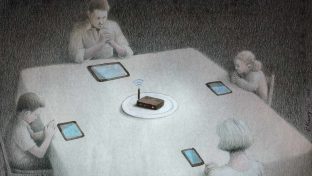4 Ways To Help Your Lonely Teenager Navigate Their Loneliness

Loneliness in teenagers may be difficult to identify and struggling to understand your teen can be one of the most daunting tasks you’ll face as a parent or guardian.
- More than 70% of teens experience recurring loneliness and 40% of those aged 16-24 say they feel lonely often or very often, more than any other age group.
- High school seniors spend one hour less per day engaging in face-to-face interactions with their peers, compared to those of the same age in the 1980s.
- Often, teenagers don’t know how to express their loneliness verbally and parents should watch for the signs, which can include negative or impulsive behaviors such as severe weight loss or gain, self-harm (cutting, skin picking, nail-biting), running away, stealing alcohol, smoking marijuana, reckless driving, and stealing.
- Parents need to be both proactive and reactive to help their teens navigate loneliness, which may include therapy, having safe adults to confide in, building social connections, and self-reflection.
Struggling with loneliness or having a mental health crisis?
- Suicide Prevention Lifeline: 1-800-273-TALK (8255); Deaf or hard of hearing dial 711 before the number or connect via online chat
Recently, I opened my inbox and discovered an invitation to my 20-year high school reunion.
My heart sunk for a moment.
I began using social media only a short while ago and have not seen, heard, or known anything about the people I attended high school with.
For a moment, I paused to reflect on what I was like back then.
While I experienced great moments of happiness, joy, and excitement as a teenager, I also remember feeling a general sense of loneliness.
In all fairness to my Class of 2000 pals, I think it was self-imposed.
Although I was invited to do things and go places, I always felt like I was living on the outside compared to everyone else.
I went to high school in the late 90s — the peak of the teen movie movement.
Understandably, many of my weekend nights were spent on the couch watching VHS renditions of what the lives of teenagers were supposed to look like.
Mine couldn’t have been more different.
Twenty years later, hindsight made it clear that nobody’s life resembled those idyllic movie scenes, although, at the time, you couldn’t have convinced me otherwise.
The disconnect between what my life was and what I thought it should have been prohibited me from going out there and experiencing more things.
Take a journey with me and close your eyes for a moment.
I want you to think back a decade (or two, or three) and try to remember what it felt like to be a teenager.
How did you feel?
Were you happy, sad, angry, excited…or lonely?
My guess is that you were probably each of those things — and perhaps all of them at once.
Statistics prove that loneliness is not unique to a particular decade, gender, or class; it is a universal and pervasive experience.
Today, I am the mother of a teenager who belongs to Gen Z and struggles with loneliness.
She looks like me and sometimes behaves as I do, but if you were to ask her about the similarities we share, she would tell you that we’re poles apart — as night is to day.
But maybe we’re not quite as different as she believes.
She struggles with loneliness, just as I did at her age.
Whether you belong to my generation or one that came earlier, I am going to share insights that I greatly needed as a parent in today’s world, explain why teenagers might feel lonely, and discover ways to get them the help they need.
How Do I Know If My Teenager Is Lonely?

Can I be super real with you for a moment?
As a parent, my biggest fear is my daughter losing (or taking) her own life.
As it turns out, my fears may be warranted.
According to the CDC, suicide rates increased from 2007-2017 for those aged 10-24. Since loneliness may be a contributing factor, it is vital for parents and loved ones to know what to look out for.
Loneliness may not be something any of us can completely escape.
The elderly, the young, only children or those with siblings and everyone in between will likely experience loneliness at some point in their lives.
What Are The Characteristics Of A Lonely Teen?
This is a tough one.
As a former teenager and the parent of a current teen, I am aware that loneliness can be easy to hide, tricky to diagnose, and pervasive if not intervened.
Katie Ziskind, a licensed family and marriage therapist, explained:
“Loneliness for teenagers is often something they don’t know how to express verbally and parents need to be on the lookout for negative behaviors that can communicate a teen’s loneliness.
Look out for reckless, negative behaviors including severe weight loss, severe weight gain, self-harm, cutting, skin picking, nail-biting, running away, stealing alcohol, smoking marijuana, reckless driving, stealing, and other impulsive behaviors.”
Psychologist Dr. Grand McDonald told me that teens are impacted by loneliness physically, mentally, and emotionally in the following ways:
Physically:
- Loss of weight or weight gain
- Disruption in sleep patterns
- Changes in appetite
- Problematic changes in the cardiovascular, hormonal, and immune systems
- Poor physical health in general
Mentally:
- Self-deprecating thoughts
- Distractibility
- Depression
- Inability to handle stressful situations
Emotionally:
- Sadness
- Low self-esteem
- Suicidal thoughts
- Self-defeating sense of hopelessness and helplessness that can perpetuate isolation and a relentless cycle
Furthermore, Dr. McDonald warns that loneliness can look like a disconnection from family and friends.
“It can also look like difficulty creating authentic relationships, or feeling like they don’t fit in,” she explained.
“Loneliness can also look like a lack of a romantic life, especially if a student’s friends have met significant others, or if a student is looking for intimacy and cannot seem to find it,” she said.
“Their loneliness may be more pronounced [while] seeing their friends ‘succeed’ in this area,” she added.
Unfortunately, there is no single, concrete way to diagnose loneliness.
Parents are on the front lines and we’re the first to identify changes in our teens that may warrant further exploration.
Loneliness in teenagers can be easy to hide and difficult to diagnose, however, reckless and negative behaviors may be one of the first signs.
Teen loneliness can be accompanied by a variety of physical, mental, and emotional symptoms and it’s important that parents recognize any sudden changes in their teenagers so intervention can begin as soon as possible.
How To Help Your Teenager Cope With Loneliness

Helping our teens as they combat loneliness may require a two-prong strategy: we must be willing to be both proactive and reactive to offer better support.
Reactively, we have to recognize the aforementioned characteristics of a lonely teen so we know when to intervene and triage the situation.
Proactively, we must support our teens in a way that wards off loneliness before it starts…or at the very least, greatly minimizes the impact it has.
The solution and strategy for both scenarios may include many of the same suggestions.
Lonely Teenagers May Benefit From Therapy
Getting your teen to accept going to therapy can be a daunting task.
Keri Powell offered a strategy that may help you get your child the help they need.
“Sit your teen down. Ask them to describe what they are going through. Don’t interrupt, not even once. Wait until they are done talking. Explain that, as a parent, you don’t necessarily understand everything they are feeling, and you don’t necessarily have the tools to help, but a therapist has many more tools to potentially help them.”
According to Katie Ziskind, the licensed family and marriage therapist I spoke with earlier, teens may benefit from regular therapy.
“Your teenager would deeply benefit from working with a therapist or counselor on a weekly basis because they have intense emotions they don’t know how to communicate,” she explained.
“Therapy could help your teenager communicate their feelings and help them deal with their loneliness in a constructive and healthy way,” she added.
Therapy achieves both goals of triaging a situation once loneliness has been identified while keeping it at bay if continued.
Safe Adults Can Help Mitigate Teenage Loneliness
As a parent, I like to think that I am approachable to my teenage daughter.
I like to believe that she can (and will) come to me with anything and that together we can solve her problem.
Yet, the truth is that although it is helpful for adults to serve in a problem-solving role with teens, not all teens will feel comfortable seeing their parents in this light.
Leaning again on advice from therapist Jessica Tappana, who I spoke with earlier:
“It’s important that teens have safe adults to talk to about their experiences. Parents usually want to be this adult, but often the teenagers don’t see their parents as representing the average person.
Instead, a coach, teacher, family friend, or therapist may be a great choice. If a teen has another person they can talk to who can listen to their experiences, normalize those emotions, and strategize how to respond to stressful situations, it can help the teenager significantly.
The teen can begin to recognize that they’re not alone, get useful advice, and feel that sense of connection that can help them avoid loneliness.”
As much as it may hurt my Supermom ego, I know that I need to assist my daughter in identifying a safe adult she can reach out to when needed.
Similar to the role of a sponsor in a 12-step program, a safe adult can be a sound, experienced individual who can offer strength and hope to your teen when in distress.
Social Connection And The Lonely Teen
Teens need to be able to connect with their peers.
While the use of technology can be a great way to maintain connectivity, we have already identified ways in which this can be misused.
Nothing takes the place of being in the physical presence of another person.
It is greatly recommended for teens to plan events with friends where they can engage in activities face-to-face and not just behind a screen.
Licensed clinical psychologist, Dr. Bruce L. Thiessen, suggests that professionals can, “establish off-the-grid summer camps for teens, in which teens would gather in a relatively remote area, and learn to engage with other teens without the aid of any electronic device.”
Another suggestion from Dr. Thiessen is “to encourage students to take set breaks from social media, to experiment with face-to-face social activities.”
While social media is now an ingrained way of connecting with other individuals, it is important to remember the power of being in the same room together without any electronics in sight.
Reflective Coping Mechanisms For Teen Loneliness
Sometimes our teens may need to look within and engage with their loneliness to better understand its roots and how to navigate through the process.
Dr. Grand McDonald, the psychologist I spoke with earlier, said she would advise teenagers to reflect on what their lives would look like if they weren’t lonely at all.
She gave examples of what that might mean, whether it’s joining a club, spending time with family, weekly dinners with friends, reaching out to other people more often, or discovering spirituality or religion.
“Experiencing loneliness may be the time to truly spend time with themselves, and discover their passions, activities they take pleasure in, what they want to improve about themselves, and get to enjoy being with themselves,” she explained.
“Experiencing loneliness is not an abnormal experience, and it can be dealt with [by] taking steps to address it and not allowing it to become an overwhelming experience,” she added.
Dr. Lauren Cook, a therapist and motivational speaker, said, “Give space for the experience. It’s normal to feel lonely during these times and letting yourself process these feelings is a healthy way to cope, rather than trying to ignore it.”
Additionally, she suggests being proactive when it comes to making plans:
“We need to implement what’s called behavioral activation. This includes making a plan to engage and sticking with it. We cannot wait for people to approach us — we need to be the one to send the invite. When we take this action, we feel empowered and our mood tends to improve.”
Dr. Thiessen, the clinical psychologist who suggested teens take a break from social media, said that constant catharsis can be used as a reflective coping mechanism for teen loneliness.
He explains catharsis in the following way:
“Catharsis is a term that refers to the gaining of emotional release by letting out all that has been bottled up and repressed.
This can be experienced by way of self-closure…sharing one’s deepest secrets, hopes, dreams, ambitions, conflicts, distressing emotions, and the like.
This can also be accomplished through creative expression, such as playing music, or participation in art projects.
Catharsis can also consist of any functional activities, such as athletic events, that allow for pent up tension to be released.”
When seeking to identify the source(s) of their loneliness, this type of reflection may be a great tool that will support teens during this phase of their life and set them up for success as adults, as well.
Therapy, safe adults, social connection, and reflection are great coping mechanisms to triage teenage loneliness and keep it at bay.
The strategy to combat loneliness in teens may involve one or more of these methods at the same time.
What Does A Lonely Teenager Look And Act Like?

My daughter stopped coming to the table at dinnertime.
She constantly wanted to stay in her room and begged me to cancel her extra-curricular activities.
Her friends came around less and less.
As a former teenage girl myself, I figured my daughter was just being moody or that she was addicted to electronics.
As time passed and the behavior continued, however, I realized that what she was experiencing was most likely teenage loneliness.
Spoiler alert: it turns out I was wrong. Well…maybe.
One night, I confronted her about it. She was sitting on her bed and drawing when I walked into her room.
I gently sat down beside her and asked — point-blank — if she ever experiences loneliness.
She looked at me as though I had three heads.
Probing a bit more, I asked her to describe an experience that ever made her feel alone.
Not wanting to offer up too much, she said, “Well I guess when I’m going through a tough situation and my friends don’t show they care.”
She immediately returned to her drawing.
I was curious to know if social media ever makes her feel lonely, as it does for many of those belonging to Generation Z, so I asked her. Her response somewhat surprised me.
“Only when friends discuss events that I’m not a part of,” she said while keeping her eyes glued to the paper.
Deciding to give her some space, I thanked her and asked if she needed anything.
“For you to leave my room now.”
I left, feeling pretty sure that her reaction was typical and that I had no need for concern…or did I?
Reaching out for more insight, I talked to other teens — whose names I’ve changed to protect their privacy.
Layla’s parents are divorced and she told me that the only time she feels lonely is when spending the weekend with the one she has a harder time connecting with.
“I love being at school,” she explained. “School is where I can see and be with my friends.”
In contrast, 18-year-old Maria told me that she has felt alone and has also witnessed loneliness in others.
“I never went out to my town to party,” she said. “I never suggested doing things myself and usually just sat at home.”
Maria noted that she’s lost some of that tendency with time and is happy about the change.
She told me that her previous behavior was largely due to her own uncertainty and because “status” is important on social media and in school.
So, which is it?
Are teens more lonely at home or at school? Do they feel connected or disconnected from others? When your teenager is left out of something, does this create lasting feelings of loneliness?
The truth is a mixed bag.
Jessica Tappana, a teen therapist, told me that most teenagers feel lonely at some point.
“They are at an age where they are just starting to identify themselves as individuals and separate from their parent’s ideals,” Jessica said. She explained:
“The teen years are a time to ‘try on’ different values and discover what is really important to you.
However, this means that teens will ‘try on’ values or things that are very different from their parents, leading them to feel more separate than they once did.
At the same time, they don’t always see the ways their peers are experiencing the same thing. So they think these big, complicated, always-changing feelings they are having, set them apart.”
Jessica’s response helped me to better understand my own teenager’s behavior.
When my daughter is a bit disconnected from me, maybe she is trying to connect with others in ways that are much different than what I’ve taught her.
Perhaps I have misread her signs and actions for loneliness. Or maybe she’s been lonely in other situations when I wrongly assumed she was engaged and connected.
Prompted by such confusion, I decided to learn more.
Loneliness is real and teenage loneliness is no exception.
Talk to your teen to find out what they are feeling.
Not every teen will be lonely all the time, but many are.
Identifying the needs of your son or daughter is the first step toward helping them.
The Impact Of Social Media On Teenage Loneliness

When loneliness in teens is discussed, social media is often either looked at as the culprit or as a coping mechanism.
Loneliness is rampant among Gen Z, and in many ways, social media and technology have certainly played a role to some extent.
Grateful that the extent of my online experience as a teenager was a bad AOL dial-up connection that occasionally led me to chat rooms, I’m unsure what impact today’s level of social media would have had on me.
My daughter’s reality is vastly different.
She was six months old when YouTube was created.
She has grown up with access to people and things around the world through various devices for her entire life.
My daughter’s social media savvy surpassed my own by the time she was 10.
Although I was cautious about her use of technology, I generally felt confident that she would make good decisions and use it for her benefit.
And for the most part, she has.
One day, I noticed she was in a funk and I asked her what was wrong. She told me she had viewed some artwork on her friend’s Instagram page and felt like it was better than her own.
For the next 45 minutes, I couldn’t convince her otherwise.
I finally told her that she would have to stop looking at social media if she was going to constantly compare her work to that of others and feel bad about it afterward.
It was a complete circle-of-life moment. When I was her age, I compared myself to the images I saw in ’90s teen movies.
For my daughter, it was someone else’s artwork. For my friend’s daughter, it is fashion and makeup.
In the age of easy access to everyone and everything, young people have the opportunity to view the lives of others, but that also leads them to compare other people to themselves.
So, is social media all bad? Not necessarily.
According to Mike, parent of three teenagers:
“Social media helps our teens connect in an incredible way, but it’s important that it’s not the only way. We should all be encouraging our teens who are on social media to not just be lurkers but to be actively engaging their voice with groups around their interests.
When teens just use social media to watch what others in school are doing, FOMO can arise (fear of missing out) and that can drive up the emotions of feeling lonely.”
Amanda Parker, ICF certified confidence coach for underprivileged youth, told me that greater access to technology can also increase teens’ dissatisfaction with themselves and their lifestyles.
“This encourages them to portray themselves differently in order to conform to what they think will be most accepted by peers,” she explained.
“Although this struggle has always happened with teens wanting to fit in, the use of social media can encourage and amplify the social anxiety that comes with trying to fit in with peers,” she added.
Social media, just like most things, can be amazing if used correctly.
As a parent, learning about the impact it has on teenagers is what enables me to guide my daughter as she navigates social media and the type of content she exposes herself to.
It’s also prepared me to help her unpack how she feels about it afterward.
Social media can have a negative or a positive impact on teens depending on how it’s being used.
Parents and trusted adults need to understand how social media affects teenagers so they’re better equipped to offer support and guidance.
Closing Thoughts
As a parent, you’re going to make mistakes.
There will be times when you’ll miss all of the warning signs mentioned in this article and your teen’s loneliness might be obvious to everyone else.
You may even fail at triaging the loneliness in your teenager no matter how much you try.
This isn’t a one-size-fits-all guide to “fixing” your teen because our teenagers do not need to be fixed.
They are not broken.
What they do need is support, love, and encouragement.
Let them know you are there. Let them see your concern and remind them daily that you care about them. Say “I love you” often.
Most importantly, don’t give up.
Whether you are parenting in a partnership or alone, being a good mom or dad doesn’t require a psychology degree or clairvoyance.
Sometimes, the best thing we can do when we don’t know what to do is to just sit with our kids.
Let your son or daughter know that you’re a bit lost in this parenting thing. That you’re concerned about their struggles and you want to help them navigate the situation.
Listen. Watch. Hear. See.
Let your teen know that they are seen and heard.
Remember that not every teen on social media will use it incorrectly, not all hormonal teenagers will be moody, and that sometimes everybody just needs a break from the world.
There are so many things that my daughter’s generation has lived through that I feel are so foreign to me. Still, I was once her age and occasionally lonely.
Were our reasons for loneliness the same? Maybe not. But I’ve been there, done that, and survived adolescence long enough to talk about it.
While I hope she connects with other safe adults, I can still be a voice of experience, hope, and wisdom.
You can, too.
Be vigilant. Be loving. Be present. While this may not guarantee your teen will graduate from adolescence without loneliness, it will help them navigate through it.
As parents, we’re in this together.
Editor’s Note: This article is part of The Roots Of Loneliness Project, the first-of-its-kind resource that comprehensively explores the phenomenon of loneliness and over 100 types we might experience during our lives.
Find Help Now
If your teenager is showing signs of loneliness — or you are a teen who is struggling with it — we’ve put together resources to meet you wherever you are, whether you need someone to talk to right now, or are looking for longer-term ways to help.
- Suicide Prevention Lifeline: 1-800-273-TALK (8255); Deaf or hard of hearing dial 711 before the number or connect via online chat
- Resources & Emotional Support For Loneliness
- Volunteer & Pet Adoption Opportunities






